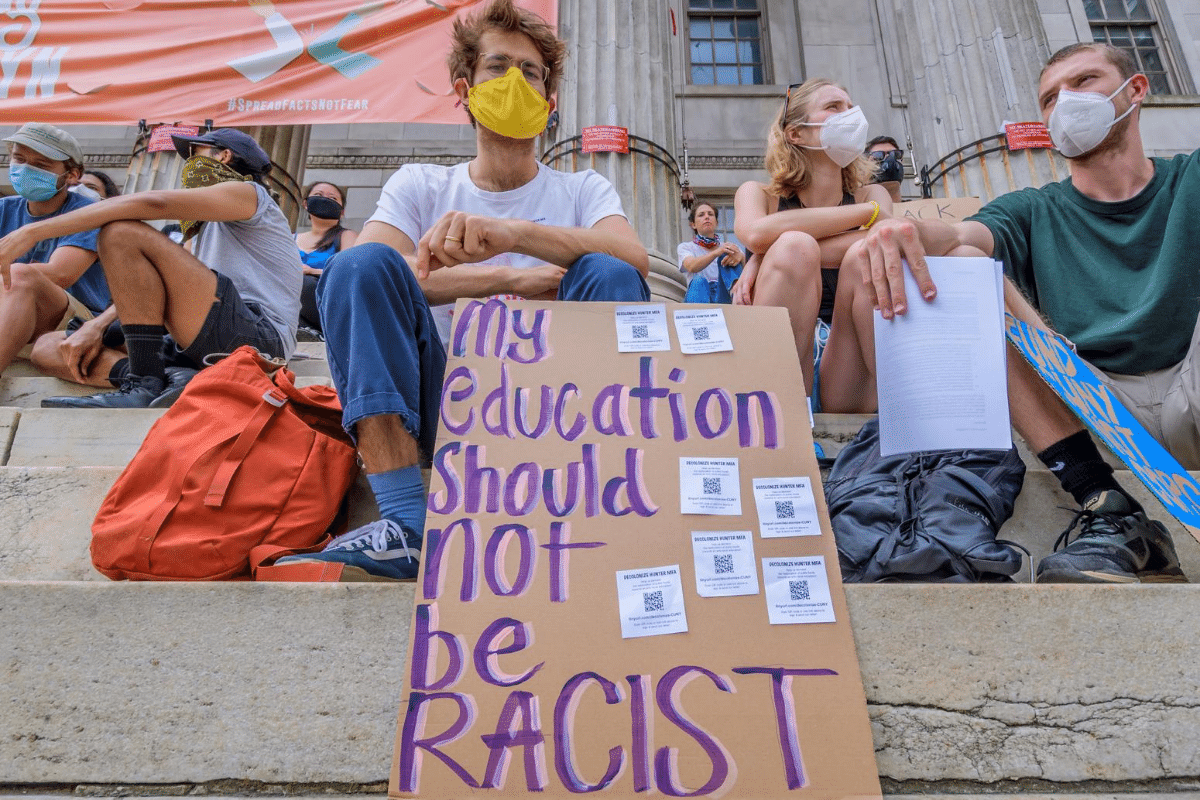Academic Free Speech
The Heckler’s Veto and the Right to Free Association
It's not just a matter of weighing up one group’s free speech against another group’s counter-speech. It’s also about one group’s freedom of association being impeded.

Note: This is an extended version of my contribution to the panel “Free Speech on Campus: Should Hecklers Be Banned?” at the Battle of Ideas Festival, held in London in October 2023.
The heckler’s veto is, roughly, a veto over another person’s speech, exercised by opponents of the speaker and/or their speech. It can involve interrupting, shouting over, distracting from, or drowning out what the speaker is saying. It can also refer to the attempt to sabotage an entire event or prevent it from taking place to begin with, in order to prevent certain speakers from participating or certain views from being aired. Thus the heckler’s veto often has the effect of preventing audiences from hearing what they wanted to hear.
One recent example of this latter phenomenon occurred when Tokyo College at the University of Tokyo cancelled the event “Feminist Activism in Japan,” scheduled for 11 December. The college has provided only the vaguest justification for this, claiming that the event cannot take place “Due to various circumstances,” but one of the speakers, Caroline Norma, has reason to suspect the explanation was her “transphobic,” i.e., radical feminist views.
Iranian-born human rights activist Maryam Namazie was likewise subject to the heckler’s veto in 2015, when her talk organized by the Atheist, Secularist and Humanist Society (ASH) at Goldsmith’s University was disrupted by protesters from the university’s Islamic Society, who shouted over her, turned off her projector, and repeatedly banged the door, among other things. They claimed that their actions were justified because Namazie is “Islamophobic” and because they had already made a “polite request” to ASH to rescind her invitation.
The standard framing for thinking about the heckler’s veto is in terms of free speech: the speech of an invited campus speaker, for example, versus the speech of those who oppose her. This framing raises several questions for those who care about free speech. Whose speech is more important? Is it coherent to protect the speech of one group when it aims to shut down the speech of another group? And is it coherent to sanction the speech of one side just because it criticizes, opposes, or otherwise disagrees with the other side? Many people insist that the correct response to hate speech is counter-speech, not suppression of speech. Isn’t the heckler’s veto just a form of counter-speech—at least when it is limited to heckling and disruption at an event, rather than shutting down or preventing an event?

The UK’s new Higher Education (Freedom of Speech) Act 2023 states that universities have a “Duty to take steps to secure freedom of speech.” The Act stipulates that universities must neither deny the use of their premises for events nor pass security costs on to event organizers on speech-related grounds. This is to stop universities from taking indirect measures to prevent controversial events from taking place by making them too costly for the organizers, who may not be able to afford the considerable additional expenses of hiring an off-campus venue and/or booking a private security firm. The act also seeks to protect staff against losing their jobs or being turned down for promotion on speech-related grounds.
In 2022, academics James Murray and Alice Sullivan, writing in Times Higher Education, proposed that the then current Higher Education (Freedom of Speech) Bill needed a heckler’s veto amendment. They were concerned that a defence of the heckler’s veto “as itself a form of free speech … confuses the right to protest and criticise with a right to silence others.” Their proposed amendment included the statement:
a registered higher education provider may take no steps to secure any exercise of freedom of speech within the law which has the purpose, and might reasonably be expected to have the effect, of restricting another’s right to freedom of speech within the law or academic freedom.
They explained:
This is a probing amendment to explore to what extent the Bill covers behaviour designed to drown out a speaker. It explicitly excludes attempts to silence the speech of others from the core duty under the Bill. It requires providers to take steps to mitigate the effects of those heckling without disproportionately affecting the right to lawful protest.
The proposed amendment was unsuccessful, so it remains unclear to what extent the Act will view those hecklers who disrupt and silence the speech of others as simply exercising their own protected free speech rights.
But freedom of speech is not the only value at stake in the heckler’s veto. There is also the question of freedom of association.
When association is free, we get to choose who we associate with; we can gather in groups of like-minded individuals to pursue our projects. The opposite of free association is compelled association. When association is compelled, we are not allowed to choose who we associate with or—at the very least—there are certain categories of people who we may not be allowed to prevent from associating with us for certain kinds of purposes.
There are two separate ideas to consider in relation to the heckler’s veto and freedom of association. The first consideration is that getting together with others (that is, exercising our freedom to associate with others) serves a number of interests, including freedom of thought, and the heckler may be interfering with those interests by heckling. The second is simply that freedom of association means that we’re free to get together to do things, and the heckler may be interfering with or disrupting our ability to do that. Let’s consider each of these ideas in more detail.

The philosopher Seana Shiffrin has argued against compelled association because it stymies freedom of thought. She writes that associations are “special sites for the generation and germination of thoughts and ideas.” Since we often refine our thoughts by discussing them in groups, if we are forced to compose our groups in a certain way, then the content of our thoughts will also be constrained accordingly.
As Shiffrin points out, if inclusion is mandated in the interests of social equality, this is likely to influence the way the group thinks and the thoughts that result. This is often given as a reason for mandating that inclusion. One of the legal cases she discusses involves a previously all-male organization, the Jaycees, which was forced to admit women. She writes:
Comprehensive anti-discrimination and desegregation efforts (as opposed to narrow efforts focused only on ensuring access to particular resources) appeal to the hope that integration of and exposure to excluded groups will affect people’s thinking. Interaction with members of different races or genders exposes one more vividly to their points of view, serves to humanize and vivify a group that has been caricatured, stereotyped, or erased, and makes one less likely to ignore or downplay their interests and concerns. Surely the real impetus behind the compelled inclusion of women in the Jaycees was not the abstract idea that women as well as men should have an equal opportunity to promote the interests of young men. Wasn’t it more likely the notion that the integration of women into this association and ones like it would have a salutary influence on how such associations devoted their energies and conceived of their missions? They would come to include women not only as members but as beneficiaries of their efforts.
The point here is that some groups are allowed to exclude people. It’s seen as important to protect their freedom of association because it’s important to protect their freedom of thought. Other groups are not allowed to exclude people. If we don’t want to protect those groups’ current thoughts (and expressions of them), we won’t want to protect their freedom of association.
Unless hecklers have a valid case for being included in the events they heckle in the interests of equality or desegregation, the argument outlined above suggests that people should be permitted to exclude them. (Of course, disruption is often done in the name of equality, so we will have to consider the hecklers’ justification critically.)
The other, more straightforward implication of thinking about the heckler’s veto in terms of freedom of association rather than freedom of speech is—as philosophers Emily McTernan and Bob Simpson have argued—that for most of the campus events at which the question of the heckler’s veto arises, the group that organized the event and the people who booked tickets have the right to get together for the purpose of the event, and the heckler is hindering them from doing so.
Those who are curious about a topic may invite a speaker to campus and be looking forward to refining their ideas together in response to what that speaker has to say. It’s partly about speech—hearing the speaker’s ideas—but it’s partly about association, too: about meeting up, attending the event together, talking to each other, and perhaps going out together afterwards to discuss things further.
Exercise of this right to freedom of association is likely to be particularly important when the group is united by a minority viewpoint, and even more so when those who hold that minority view are despised or vilified (as radical and gender-critical feminists are, to return to the University of Tokyo case we started with).
The heckler’s veto, then, is not just a matter of weighing up one group’s free speech against another group’s counter-speech. It’s also a matter of one group’s freedom of association being impeded.
McTernan and Simpson suggest that we distinguish between open and closed associative contexts: at open events, such as town hall meetings, it’s in the public interest for anyone to be able to attend and have their say; closed events, on the other hand, exist to advance the interests of specific groups. They recommend only protecting hecklers in open contexts. That would permit the exclusion of hecklers from many of the disrupted university events that have been in the UK news over the past year. It would serve the same kind of purpose as Murray and Sullivan’s proposed amendment—just done on a discretionary basis, rather than formally mandated by law. McTernan and Simpson’s distinction can help universities to create different guidelines for different types of events, and better protect closed events.






